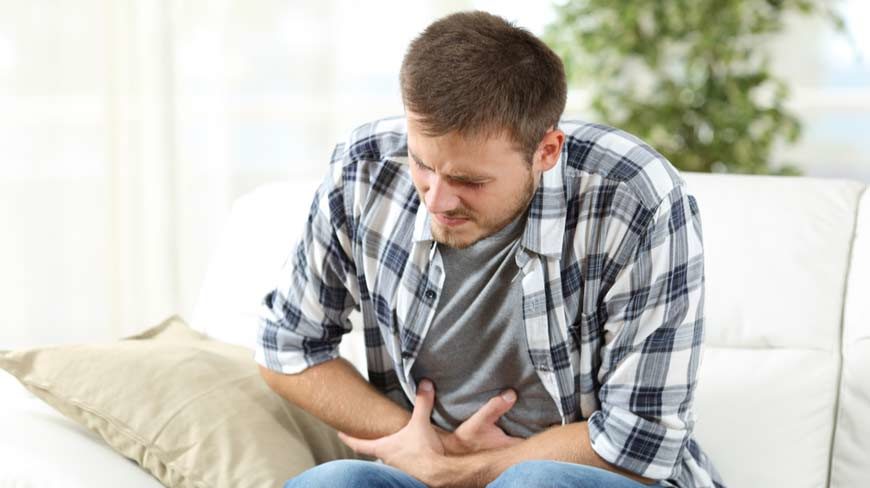What is Diverticulitis?
Diverticulitis is the inflammation and infection of tiny bulges in your colon wall called diverticula. It can come on suddenly and can be very painful.
The precursor to diverticulitis is diverticulosis. That simply means that diverticula are present in your colon, but not inflamed. Diverticula can be pea-sized or larger. They typically don’t cause any symptoms unless they become inflamed. They most often form in your lower left side, in the sigmoid colon.
What Causes Diverticulitis?
Diverticulitis is relatively common, but the exact cause is unknown. It may be due to eating a low-fiber diet. Risk factors include being:
Additionally, lifestyle factors can increase the risk of diverticulitis. These include:
- Eating a low-fiber diet high in red meat and fatty foods
- Leading a sedentary life
- Smoking
- Taking NSAIDs
Symptoms
Symptoms of diverticulitis can include:
- Change in bowel habits
- Chills
- Constipation
- Cramping in the lower abdomen
- Diarrhea
- Fever
- Nausea, vomiting
- Pain or tenderness, usually in the lower-left side of your abdomen
- Rectal bleeding
Because these symptoms can be similar to other gastrointestinal conditions, it’s essential to see your doctor to determine the cause and discuss treatment.
Diagnosing Diverticulitis
Your physician will examine your abdomen to check for tenderness and asks questions about your:
- Bowel movements
- Current medications
- Diet
- Medical history
- Symptoms
You may also have diagnostic tests, including:
- Angiography – to locate the cause of any rectal bleeding
- Barium enema – to make problems in your colon more visible on X-ray
- Blood test – to check for signs of infection
- Colonoscopy – to examine your colon
- CT – to look for inflamed or infected diverticula
- Digital rectal exam – to check for problems in your anus or rectum
- Sigmoidoscopy – to view your sigmoid colon through a tiny camera
- Stool sample – to check for bacteria or parasites
Treatment
Rest and antibiotics are often enough. Most people recover in a few days to a few weeks. If your diverticulitis goes away and keeps coming back, surgery may be necessary.
- Treatment depends on the severity of your symptoms and may include:
- IV antibiotics or fluids
- Low-fiber or liquid diet until symptoms improve
- Oral antibiotics
- Over the counter pain medications
- Rest
- Surgery
Complications of Diverticulitis
It’s important to see your doctor if you are experiencing symptoms of diverticulitis. It can cause complications ranging from uncomfortable to dangerous, including:
- Abscess (a sore)
- Blockage in the colon
- Infection
- Perforated colon
- Urinary tract infections
When is Surgery Recommended?
Surgery removes the diseased section of the colon. The healthy end of the colon will then be attached to the rectum. Sometimes, a colostomy is needed temporarily to allow the colon to heal. The colon can be reattached when it’s healed and the colostomy bag removed.
Surgery is typically considered if you have:
- Abscesses
- Blockages or strictures
- Diverticular bleeding
- Fistulas
- Perforation/peritonitis
- You’ve not responded to other treatments
- You’ve experienced multiple attacks even while eating a high-fiber diet
Prevention
If you’ve had diverticulitis once, it may come back. You can decrease the chance of it coming back with diet and exercise that encourage regular bowel movements without constipation or straining.
Once you’ve recovered, you can begin slowly adding fiber to your diet. Foods like berries, vegetables, beans, and grains are good sources of fiber. It’s not necessary to avoid nuts, seeds, or popcorn.
A sedentary lifestyle can contribute to gastrointestinal issues like diverticulitis. Getting thirty minutes of exercise at least five times per week could help prevent future attacks.
The symptoms of diverticulitis can be disruptive to your daily life. Left undiagnosed and untreated, diverticulitis can cause an abscess and dangerous infection.
If you think you may have diverticulitis, don’t wait – schedule an appointment today.
Request Appointment
Related:


